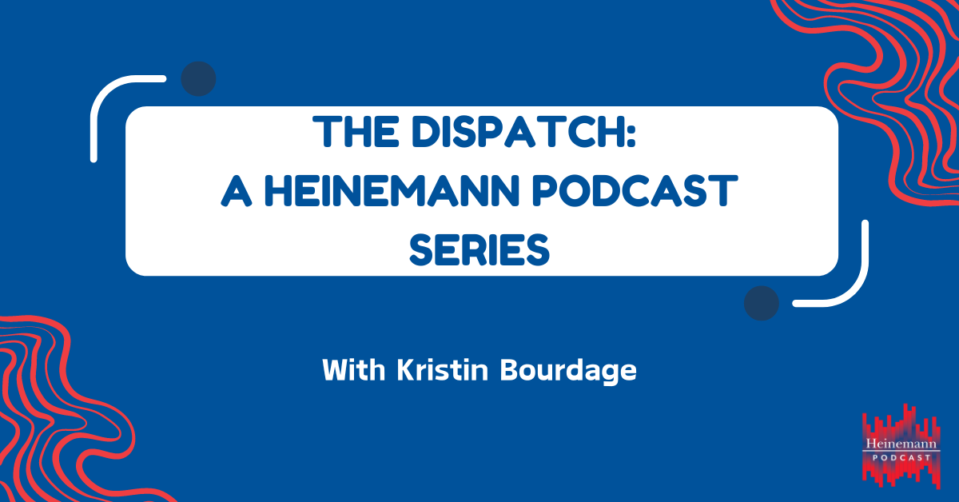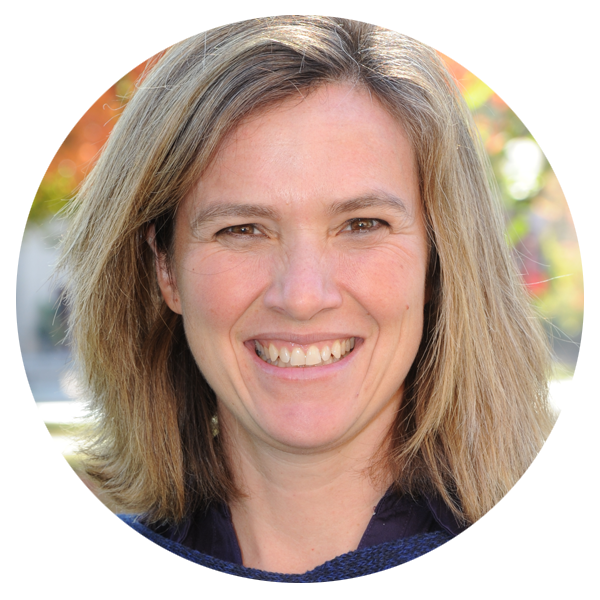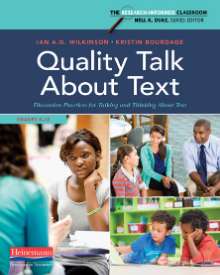
Welcome to The Dispatch, a Heinemann podcast series. Over the next several weeks, we'll hear from Heinemann thought leaders as they discuss the most pressing issues in education today. In today's episode we hear from Heinemann author Kristin Bourdage about designing instruction that deepens learning to prepare students for meeting the challenges of life with creativity, problem solving, and inquiry.
Transcript
Kristin Bourdage:
... And so we've been asking questions, how do we support these very important, whether we frame it from workforce needs, workers today, industry needs. Agile workers who are really confident and competent at solving problems, carrying out big plans, being collaborative, using feedback. I mean, how do we accomplish that in the context of a curriculum that has a very broad scope? Those are the biggest questions that we're answering currently within the context where I work.
It's exciting because we're developing skills frameworks to align to our standards-based curriculum and really trying to emphasize problem solving, creativity, critical thinking, collaboration, and discourse. Really the discourse and the collaboration, really trying to emphasize the importance of equity and inclusion in that particular context to ensure that we are ready for this pluralistic society that's here.
Edie:
Hi, this is Edie. Welcome to The Dispatch, a Heinemann podcast series. Over the next several weeks, we'll hear from Heinemann thought leaders as they discuss the most pressing issues in education today. In today's episode, we hear from Heinemann author Kristin, about designing instruction that deepens learning to prepare students for meeting the challenges of life with creativity, problem solving, and inquiry. Our conversation begins with Kristen's reflection on her tenure in education. So you are in K-12 education right now?
Kristin:
Yeah, I've had a journey. I started out teaching, language arts literacy was my home base originally out of college. Then came to Columbus, Ohio for Ohio State's doctoral program. Became a teacher educator of literacy. This is my fourth year in a return to K-12, so I was in higher ed about 20 years. Altogether, I think I'm at 28 or 29 years in education. Yeah, it's been an interesting journey and just a fabulous tenure. My role now is I'm a curriculum and instruction administrator at Olentangy schools, which is a suburb north of Columbus.
Edie:
How's that been? Going back to K-12 from higher ed?
Kristin:
It's been amazing because I think that 20 years preparing teachers, which was my primary role, really supported a depth of understanding of teaching and learning. When you have to teach something, you know it really well. When you do so for year after year, you just continue to deepen that knowledge and grow that knowledge base. So I'm bringing that back to this role where I am supporting and leading curriculum initiatives in the district, and it's been great because I feel very flexible with our decisions that we make and the teams that we convene, in part because I kind of know where we're headed. I'm not always trying to figure it out as we're doing it. I feel there's a level of confidence there due to the 20 years of really studying pedagogy very deeply.
Edie:
What are the pressing issues you're thinking about with your colleagues and individually and sort of talking about over and over again right now in education?
Kristin:
Currently, we're really trying to understand how we deepen learning. The last, I'd say 10 or 15 years with standards-based initiatives and evaluation initiatives, assessment, achievement, all of those parts of what it means to learn in school today created a widening of the curriculum, which had a cost and that's deeper learning. Really trying to emphasize creativity, problem solving, inquiry. Those transfer skills that we want to see are really hard to manage in the context of our current curriculum, at least locally.
We've been asking questions, how do we support these very important, whether we frame it from workforce needs, workers today, industry needs. Agile workers who are really confident and competent at solving problems, carrying out big plans, being collaborative, using feedback. How do we accomplish that in the context of a curriculum that has a very broad scope? Those are the biggest questions that we're answering currently within the context where I work.
It's exciting because we're developing skills frameworks to align to our standards based curriculum and really trying to emphasize problem solving, creativity, critical thinking, collaboration, and discourse. Really the discourse and the collaboration, really trying to emphasize the importance of equity and inclusion in that particular context to ensure that we are ready for this pluralistic society that's here.
Edie:
Do you feel good about the progress you're making in that direction as a team?
Kristin:
Yeah, teachers are excited about it. I think when I ask the question what do our learners need the most, the answer is almost always related to those transfer skills or those long-term skills or skills that we want all of our children to have when they finish school-
Edie:
As humans in the world.
Kristin:
Yeah, as humans. Whether it's kindness, I haven't mentioned kindness, but empathy is a part of what we're trying to achieve in that context of being more collaborative, being stronger at communication, and really communication across differences so that we're really ensuring that we have humans that really want to not just work together.
I mean, oftentimes in K-12 settings, we're thinking about that future goal of whether it's university as an intermediate step toward a career or just being good people. I know that sounds sort of, I don't know, maybe basic or just like... But empathy does matter and it is a big part of the frameworks that we're using to redesign some of the curriculum around these transfer skills that matter for work and life.
Edie:
Yeah, no, it doesn't sound basic and it's when you get into that, it's hard work when you get specific about it.
Kristin:
Yeah, because we can be, again, our structures demand that we focus on achievement and achievement is aligned to cognition. Great, that's our business. But when we really start to think about, no, what really matters for children, for learners, for people, we start to think about these other aspects of a well-rounded experience and becoming equipped for whatever it is a learner wants to do.
So that's what we're doing. It's exciting to me because I love curriculum. My curriculum brain is always very alive when I'm working with teachers.
Edie:
On fire.
Kristin:
Yeah, it's on fire when we're working with teachers and talking about, we're working on a project right now with social studies teachers, and we're really trying to understand where does historical inquiry fit, again, in a curriculum that has a lot of demands from the scope and the breadth of what learners need to know in social studies and where does historical inquiry fit? Asking that question is exciting for all of us because we know that that's what matters most is that inquiry skills transcend anything we can do in one particular class and one particular grade level.
Edie:
I'd love to hear a little bit about that inquiry project you're talking about that you're working with your group. What that looks like in the classroom with the students.
Kristin:
For us, it's looking through the lens of inquiry as a historian might look at documents. My background, by the way, is not social studies, or I'm not trained as a historian, but really using that lens of inquiry as a historian would look at documents. So asking big questions, looking at primary sources, secondary sources, really deriving a claim from the evidence, trying to understand what's fact, what's opinion. Those are vital skills in social studies curriculum and inquiry process and building onto that. What's misinformation, what's disinformation. We're tackling some of those questions within the inquiry process as students derive a claim from exploring evidence that in social studies is largely text based. Doesn't always have to be, but in social studies it is, and then really supporting their claims with strong evidence and other kinds of reasons.
Edie:
Thank you for sharing your thinking about students holistically and deepening knowledge, so I appreciate that. I'm going to pivot a little bit now.
Kristin:
Okay, sure.
Edie:
I'd like to know what your influences are right now. What's on your bookshelf?
Kristin:
Okay, so I am really interested in Mayan culture right now because I'm taking a trip and so I'm reading a memoir. Sorry, I need to refresh my memory on the author's name. Sastun is the name of the text, and it's Rosita Arvigo. She is writing about her life learning from Mayan culture in the 1980s. She's American.
Edie:
Oh, interesting.
Kristin:
Yeah, and it's just been interesting because there's a lot of plant biology in it as she's learning from this Mayan medicine practices, medical practices, and she's trying to make connections to what she knows about western medicine, American versions of how we treat and support. It's just been really interesting.
Anytime I'm reading, I'm always thinking about my role and my work. It's just been interesting to think about different topics and reminds me of just the power of all kinds of ways of knowing. I think that's what the memoir really helps me understand is just that we have one version, but then there's this version where she studied for years and years with this Mayan medical shaman. I'm not sure, she uses different labels. For me, there's lots of ways of knowing and how do we capture that within our own discipline in this case of education.
Edie:
Oh, yeah, interesting. When's your trip?
Kristin:
It's coming up in December.
Edie:
It is? Oh, okay. It's right around the corner. Exciting.
Kristin:
Then in terms of education, I have been reading a lot recently about contact zones, which a modern language professor spoke about and wrote about in the nineties. This is an older concept, dug out for NCTE and presenting at NCTE. So I've been doing a ton of reading about contact zones and the research around contact zones. Contact zones are sites, any social space or social site where cultures interact and grapple. It's fascinating work because in the nineties she was writing about what we need today. You may have needed it then, but now it's like, okay, what do we do when we interact with people who are different from ourselves? Which is the NCT theme this year. She talks about grappling as the reality. It's what we do with the grappling that matters-
Edie:
How we enter the process, right?
Kristin:
Yeah, how do we move through this idea? If you are interacting with someone who has a very different worldview, let's say just as an example, how do you move through that tension? She says, there's going to be tension there, and it's what you do with that tension and how you move through it in a way that is productive. She said on the other side of that is a revelation. You have an experience where you have a deeper understanding. Whether it's through empathy or an aha moment, you understand something more deeply.
Worked with a team of teachers and teacher educators to understand our classroom with the lens of contact zones. I know it's not something that I've followed on social media because this is an older construct, but it's been just really interesting work. We presented yesterday and it was just great. Just the process has been wonderful, and teachers are super excited that they were able to present and share this work.
Edie:
Yeah, thanks for sharing that. My last question for you today. When you look across the spectrum of education right now and your own experiences right now, what is giving you hope?
Kristin:
Well, for me, at NCTE, there are thousands of teachers here who are excited about their work and their calling, their passion in supporting learners in all kinds of ways, but certainly in English language arts and literacy. I've had our teams from our school district texting me routinely just with hearts and smiley faces. Just the enthusiasm is palpable and exciting for me because that's what gives me the greatest hope in that we can move through some of these complex ideas like what I was talking about before with redesigning curriculum, with really drilling down and finding these competencies that matter and that transcend the content. If they're excited about it, it's going to happen. It just moves a little slowly, but it's a big system and there's a lot of learners, a lot of teachers, a lot of schools, and that's what gives me hope.
Edie:
What's the makeup of your teacher body right now in terms of new teachers? Veteran?
Kristin:
Yeah, so the district where I work, we have roughly 2000 teachers, so it's a large district, relatively speaking. I think it's the fourth largest in the state of Ohio. Don't quote me, I haven't fact checked that, but I think it's right around the fourth largest.
We have a healthy mix. It's a newer set of communities, so there are younger families moving in and so there are a mix of teachers with fewer than 10 years, but then there are teachers who have been there for a long time.
One of the challenges that we have, not just locally, but here in Ohio generally, is recruiting teachers of color to meet the needs of our very diverse demographic. There are schools in the Columbus area, certainly Columbus city schools, which is our largest district here, but 40, 50% students of color with 90% white teachers and so that is a challenge that the state is addressing with actionable steps with grow your own programs, recruiting teachers of color into the teaching workforce, so that's really exciting locally.
Edie:
Thank you for tuning in today. For more information and a full transcript, please visit blog.heinemann.com.

Kristin Bourdage is a curriculum and instruction administrator at Olentangy schools. Kristin’s earliest teaching assignments were second grade and language arts/reading at the middle level. She then taught literacy pedagogy to preservice teachers and facilitates professional development for K-12 teachers in literacy methods, curriculum design, project-based learning, and discussion approaches. Kristin studies classroom talk and discussion. Her latest interests explore the way classroom talk engages students in social emotional development and civic discourse. Her research has appeared in publications such as Language Arts, Language and Education, chapters in edited texts, and the National Reading Conference Yearbook. Kristin presents her work at professional education conferences at state and national levels.
studies classroom talk and discussion. Her latest interests explore the way classroom talk engages students in social emotional development and civic discourse. Her research has appeared in publications such as Language Arts, Language and Education, chapters in edited texts, and the National Reading Conference Yearbook. Kristin presents her work at professional education conferences at state and national levels.


